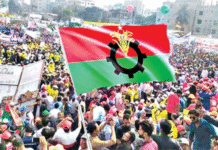
“One of my friends will come to Khabar Dabar,” said Afzal. A young man wearing a white half-sleeved shirt with combed back hair appeared at the restaurant exactly at 5 pm. Shykh Siraj had a hunch that this was the young man who Afzal had been referring to for the last few days. “If Afzal wants to transform the thinking of the local audience with this man then I’m seriously questioning his judgment,” said Siraj.
We decided to ask Afzal’s friend a few questions.
“Where are you come from?”
“From Jahangirnagar University,” was his reply, and he continued with, “Your next question must be what am I studying and why am I in Dhaka?”
Surprised by his counter questions, we told him to wait for Afzal as he would be a bit late.
Siraj had one more test for him though.
He sent a plate of nakshi pitha and patishapta pitha, and another plate of lemon, onion and cucumber to the mystery man’s table. We were waiting to see what he does.
We expected the obvious — that he would call the waiter and then either give him a sound scolding or question the kind of food he had been served. But, without any reaction he ate up the two pithas and asked the waiter to take the salad back.
That was Humayun Faridee, who was always cool and composed. Which explains how beginning with village theatre he reached the pinnacle of the Bangladeshi media. There will be piles of articles on his life, on how he played diverse roles with absolute authority on both the small and big screen. There will also be TV shows about him.
I remember Faridee, in Gangtok, on an Eid Day. The night before Eid, I discovered that the city only had one mosque located near the bus stop. But no one knew the time of the jamaat (mass prayer). So, at 7:30 am I started towards the mosque and found Faridee sleeping with his room locked. Returning to the hotel from prayer at around 10 am, I found my glum-faced mother.
“Don’t you know I need my breakfast exactly at 9 am because of my health condition?” — she asked.
“I know, but the jamaat started late at the mosque.”
“But Faridee returned way earlier than you from the mosque.”
“But Faridee…” I stopped mid-sentence and pictured the whole story in my head. How could I tell my mother that he didn’t go for prayers because he was asleep? She must’ve met him during her morning walk. And Faridee made my mother believe that he had returned from the mosque to the hotel right after the jamaat. He might have also spiced up his story by saying, “The others must be roaming around Gangtok after the jamaat.”
Wherever Faridee went he had the last laugh. Is that why he left us on the first day of Falgun?
In the midst of writing this article, two of my friends: Sanaul Arefin and Imdadul Haq Milon showed up. I asked them to look at what I had written so far. Both of them commented that there was not enough emotion in it; they also stated that many of Faridee’s contemporaries had not been mentioned in it. Who was I going to include in this article, I wondered. Bacchu Bhai [Nasiruddin Yousuff], Selim Al Deen, Shahidul Alam Sacchu and many others from the Dhaka theatre scene like Amirul Islam or Lutfur Rahman Riton? Should I mention my partners at Impress Telefilm? Should I add Azad from Azad Products? This article would never be finished if I had mentioned them all. So why not call this one only “Our Faridee”. If anyone else wants, Faridee can be theirs too.









